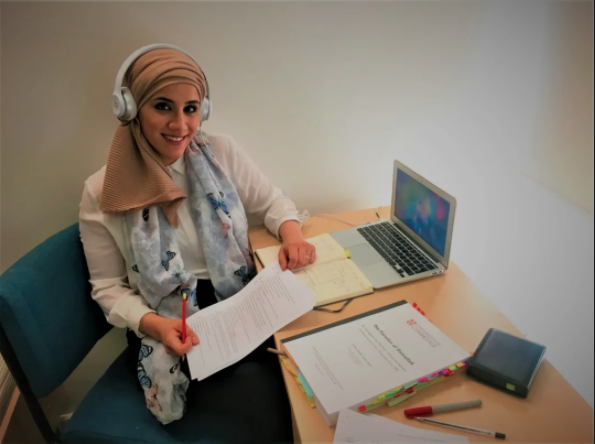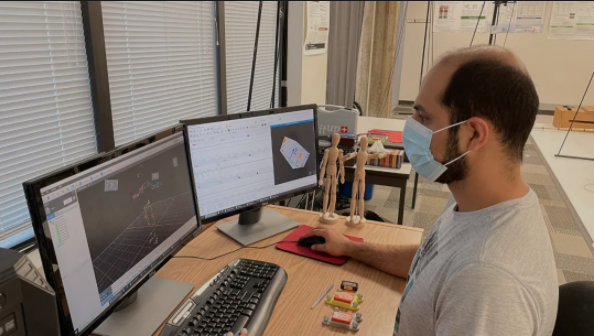AMTD Education | New scholars joining AMTD Waterloo Postdoctoral Fellowship
Two researchers will advance their postdoctoral work at Waterloo Engineering beginning next month backed by a fellowship launched last year.
Anwar Jaber and Milad Nazarahari will each receive C$75,000 annually for two years from the AMTD Waterloo Global Talent Postdoctoral Fellowship established with a C$3 million donation from Dr. Calvin Choi (BA ’01), chairman of the board of AMTD Group, and co-sponsored by Dr. Feridun Hamdullahpur, Chairman of AMTD International and former President of University of Waterloo, and Dr. Donna Strickland, Nobel Prize winner, Canadian physicist, and professor of physics at University of Waterloo.
The AMTD Waterloo Global Talent Postdoctoral Fellowship offers an unmatched opportunity to accelerate scholarship and careers for emerging world-class scholars from top universities across the globe

Jaber will join Waterloo’s School of Architecture where she’ll pursue her research into how architecture plays an important part in cities facing political transitions and extreme conditions, such as violent political and ethnonational conflicts.
As a scholar focusing on the cultural and socio-political aspects of architecture and urbanism, she will examine spatial practices of remembering under conflict, focusing on museums that aim to address national narratives of war, memory, and violence.
Anwar Jaber is a postdoctoral fellow
“In my work, I investigate the role of architecture in these cities, their urban forms, the conditions of their creation and how the built environment becomes an active contributor in shaping and absorbing urban conflicts instead of merely reflecting them,” she explains. "Understanding the interplay of politics, power and architecture becomes essential to learning how people live during and after conflicts.”
Life experience helps drive her work
Jaber’s passion for her research was sparked by her personal experience as a Palestinian growing up in East Jerusalem and completing her bachelor’s degree in Architectural Engineering at Birzeit University in Palestine.
“My interest in researching cities gripped by conflict and extreme violence came from growing up, studying, and practising architecture and urban planning in the Middle East, particularly in Jerusalem, under the Palestinian-Israeli conflict,” she says.
She holds a MPhil in Architecture and Urban Studies and PhD in Architecture from the University of Cambridge in England where she was part of the Centre for Urban Conflicts Research group at the Department of Architecture.
Jaber says she is grateful and privileged to be awarded the AMTD fellowship and to be collaborating with her supervisor Robert Jan van Pelt, a School of Architecture professor and a renowned and award-winning architect and historian.
“Joining the University of Waterloo is a unique opportunity and will provide an excellent base for me to conduct my research,” she says.
Jaber also plans to launch a new research group at the School of Architecture called Conflict and Cities and establish an international collaboration between the school and international institutions with the support of her networking connections in the Middle East, Europe, and Canada.

Designing technology for stroke patients
Nazarahari will become part of Mechanical and Mechatronics Professor Arash Arami’s lab in September where he will continue to work on developing affordable and accessible technology for stroke patients in Canada.
His research will incorporate intelligent robots and biofeedback to provide efficient and accessible post-stroke upper extremity therapy.
“Stroke is the leading cause of acquired brain injury, that is disability, in adults and is correlated with a reduced ability to perform activities of daily living,” says Nazarahari.
Conventional rehab can be impractical
While conventional rehabilitation such as performing rehabilitation exercises under therapist supervision can effectively improve stroke patients’ motor functions, the extensive long-term in-person rehabilitation can be impractical due to its high cost and limited therapist availability, he explains.
Nazarahari completed his undergraduate and master’s degrees in Mechanical Engineering in his homeland of Iran at the Iran University of Science and Technology before coming to Canada where he graduated with his PhD in Mechanical Engineering from the University of Alberta in 2020.
He was recently a member of the Neuro-Muscular Control and Biomechanics Laboratory in the Faculty of Engineering at the University of Alberta.
As a recipient of an AMTD fellowship, Nazarahari looks forward to collaborating with University of Waterloo leaders in biomedical engineering and scientists in other related fields.
“Waterloo has one of the best, if not the best, engineering programs in Canada, which can provide access to the required technical knowledge and tools for this research,” he says.
*****
Applicants need to have a doctorate degree or have met the criteria for obtaining a doctorate degree without tenure, and each person can only apply once. The application process is as followed:
• Contact a faculty member of the University of Waterloo as a mentor;
• The faculty submits the endorsement form and the staff of the program will contact the applicant;
• Submit recommendation letters;
• Applicant submits the application online.
Qualified applicants will be evaluated by the program admission committee, and the shortlisted scholars will be invited to offline or remote interviews.


